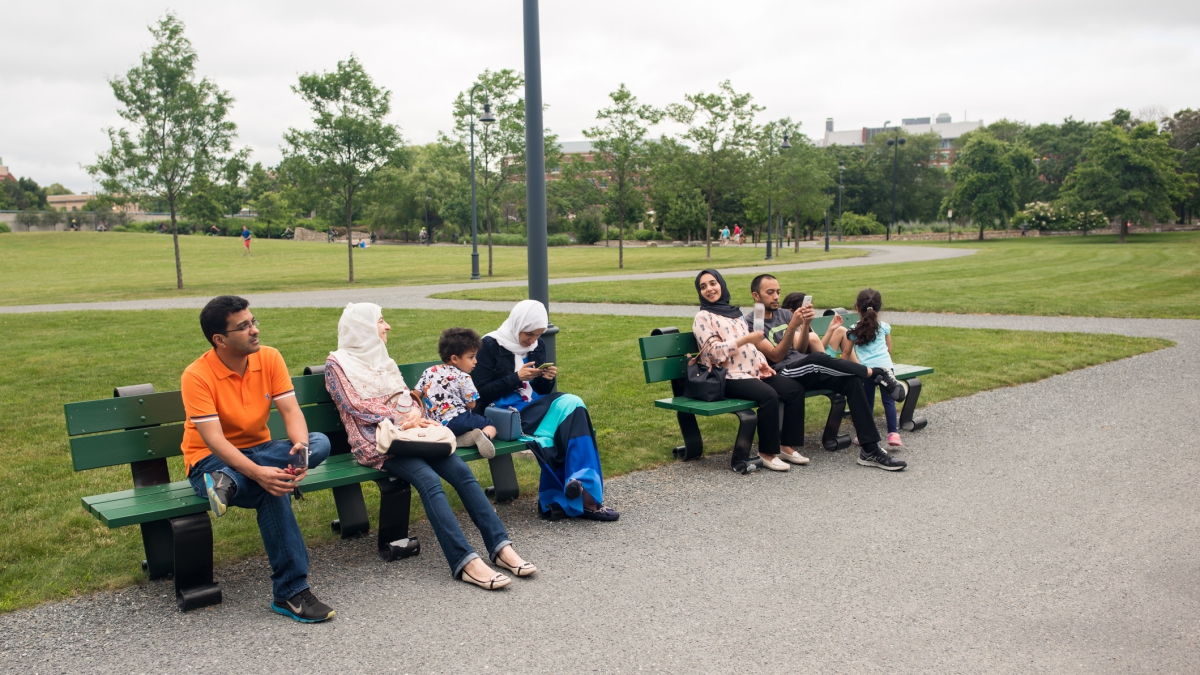Challenges of Parenting in Western Culture

Raising children with cultural values is a challenge for all immigrants who find very little in common in their adopted countries from their own. Many people from the developing third world have moved voluntarily to western countries in the last few decades. The various reasons for their migration are globalization, better opportunities for a safer, secure and prosperous life, the curse of increasing authoritarianism in their native lands, etc.
This trend will continue in all likelihood as long as their native countries fail to provide the minimum necessities of life required to arrest or discourage such voluntary migration. Then, tens of millions of people are forced to migrate because of war and/or unfathomed persecution and genocidal crimes of the state and non-state actors in many parts of the world. Myanmar, Syria, Iraq, Afghanistan, and many parts of Africa and Latin America can fall in this category.
The problem is more acute for Muslim immigrants to Western Europe, the USA, and Canada. There are serious problems within the adopted societies with high divorce rates, single parenting challenges, guns, racial and religious violence, and declining morality. Added to that is a dominant Christian culture that is doctrinally so different. In recent decades, especially since 9/11, these immigrants also face hate crimes and discrimination as never before. A 2018 Pew Research found that some 23% of born Muslims no longer identify themselves with Islam in the USA, thus diluting the Muslim percentage despite the conversion of many non-Muslims to Islam; that is, Muslims lose as many people as they gain to their faith. So serious is this identity crisis amongst immigrant Muslims and their children that, according to a Columbia University study, some 29% of Muslim youths in college campuses use non-Muslim names to hide their Islamic identity.
Assimilation and, worse yet, alienation remain serious challenges to Muslim identity for parents who want to raise their children as responsible, confident, and successful, yet faithful individuals in this fast-faced non-Muslim and sometimes hostile culture.
How can Muslim immigrants raise their children balancing between the two almost polar opposites? For a Muslim parent, it is a serious dilemma, and many are failing in this vital task miserably, sometimes blaming their fate or the choice that they had made as an immigrant – voluntarily or by force of circumstances.
While an apple to apple comparison may not be possible, arguably, there is nothing better than following the footsteps of the Prophet Muhammad (S), who had raised his children in an utterly hostile polytheistic culture that persecuted him and his followers, forcing them to immigrate from their native land. His (S) life and teachings remain the best examples for any Muslim to emulate. In Makkah, he (S) homeschooled his children and cousin Ali (RA), who grew up under his guardianship. Each one of them is a great role model for Muslims at any age.
For a Muslim, there is nothing more important than his/her faith in the Oneness of Allah, i.e., the Tawhid. If such a belief is impossible to practice in one's adopted country, migration there is considered to be wrong and highly discouraged. On the other hand, when a person's faith is threatened in his native land, he is commanded to migrate whenever possible (Qur'an 4:97-100). As a matter of fact, migration for the cause of Allah is a highly commendable and rewarding act. The Prophet Muhammad (S) himself and many of his followers migrated to Madinah (formerly Yathrib) after enduring 13 years of persecution at the hands of idolaters of Makkah.
Islamic values are timeless, comprehensive, and holistic.
Parents' role in molding a child's character is enormous, provided that parents are serious and ready to walk the talk as role models. They must nurture cultural values from the moment a child is born because Satan is ever prepared to derail every child of Adam. Remember the prayer of Maryam's (Mary) mother when she was born, as stated in the Qur'an: "I crave Thy (Allah's) protection for her and for her offspring from Satan the outcast." (Qur'an 3:36)
In Islam, it is strongly recommended that when a child is born, both the adhan and iqamah (the calls to prayer) be recited into the ears of the newborn, and an aqiqah be held with food distributed within few days to thank Allah and seek His protection for the child. Mother is recommended to breastfeed the child for two years and that both parents create the bonding with the child so that he/she can trust and love them fully.
As the child grows up, he/she should be taught the fundamentals of faith, tawhid (Oneness of God), ikhlas (sincerity), akhlaq (morality), adab (manners and etiquette), and duties (wajib) and rights (huquq), halal (permissible) and haram (forbidden).
The Prophet Muhammad (S) said, "No father has given a greater gift to his children than good moral training." [Tirmizi] The parents, like the shepherds of the household, must spend enough time to play and build such qualities that are vital to the physical, emotional, and spiritual nourishment and well-being of the child. Here the statement of Luqman, the wise man, mentioned in the Qur'an is quite instructional:
"And We had certainly given Luqman wisdom [and said], "Be grateful to Allah ." And whoever is grateful is grateful for [the benefit of] himself. And whoever denies [His favor] - then indeed, Allah is Free of need and Praiseworthy. And [mention, O Muhammad], when Luqman said to his son while he was instructing him, "O my son, do not associate [anything] with Allah. Indeed, association [with him] is great injustice." And We have enjoined upon man [care] for his parents. His mother carried him, [increasing her] in weakness upon weakness, and his weaning is in two years. Be grateful to Me and to your parents; to Me is the [final] destination. But if they endeavor to make you associate with Me that of which you have no knowledge, do not obey them but accompany them in [this] world with appropriate kindness and follow the way of those who turn back to Me [in repentance]. Then to Me will be your return, and I will inform you about what you used to do. [And Luqman said], "O my son, indeed if wrong should be the weight of a mustard seed and should be within a rock or [anywhere] in the heavens or the earth, Allah will bring it forth. Indeed, Allah is Subtle and Acquainted. O my son, establish prayer, enjoin what is right, forbid what is wrong, and be patient over what befalls you. Indeed, [all] that is of the matters [requiring] determination. And do not turn your cheek [in contempt] toward people and do not walk through the earth exultantly. Indeed, Allah does not like everyone self-deluded and boastful. And be moderate in your pace and lower your voice; indeed, the most disagreeable of sounds is the voice of donkeys." (Qur'an 33:12-19)
In this age of information, as the child grows up, especially in the western world, he/she is usually drawn to watching tv and video games, which can have a harmful effect unless these are monitored and regulated properly. Studies have shown that a child watches on average 28 hours of tv programs per week and may watch thousands of murder scenes on tv screens before eight. Such graphical images are very detrimental to the healthy mental growth of anyone, esp. young children. Instead of letting the tv babysit the children, the parents must spend quality time with their children reading and/or listening to stories that help their moral growth. They should show love and affection to their children by proactively engaging and cannot shortchange such duties and responsibilities by letting the tv or computer or a babysitter fill that gap on their behalf. It is a trust that they must fulfill.
Surely, such proactive engagement can be challenging in this age, with most people's priority on making money than anything else, including their children's emotional and spiritual well-being. Studies have shown that negligence on this vital task can be devastating. In this regard, it may not be improper to share the sad story of a junior friend of mine who lived in an affluent neighborhood in Northern California with his family. He was a very successful individual owning multiple homes in one of the most expensive areas of the USA. He and his wife were both considered ideal neighbors and very engaging with all the social and charitable activities within the community. One day, he and his wife were both found dead in their home, killed by their own son – a college-going student. The physician wife of a classmate (who died a few years earlier due to cancer) who lived near Detroit was also killed by her nephew. The slain ones in these cases were both educated and successful; they were role models for the community and were good practicing Muslims.
Yet, something was grossly wrong to have been killed by their own flesh and blood!
It is there that one cannot ignore the importance of good parenting. After all, as the children grow up and start going to schools, the gap widens between them and their parents. They are exposed to a new frontier with new ideas, rules, norms, and practices, not all of which are either right or beneficial. They start spending more time outside than inside the house (minus the sleeping time, of course). Concerned parents must own two of the three slots in their young son's or daughter's time spent – in school, street, and home – to make a difference for the better. Otherwise, it is going to be a lost cause for the parents whose children mingle with other children of all backgrounds, some from broken families, some with drugs and anger management problems, and so on. They are sure to be drawn to the Internet (or social media), which can be a mother of all evils unless it's regulated and monitored in front of their parents. As the children become adolescents, their mood also swings. They become more rebellious -- something that needs to be addressed by family members, especially the parents, in a calm, rational and loving manner. Avoiding them or not having a meaningful conversation with mutual respect can be suicidal, if not harmful.
As we know from his Seerah, the Prophet Muhammad (S) used to love his children and grandchildren fondly, kissing and hugging them affectionately, letting them ride on his back (even when he was prostrating during his prayer), running and playing with them. His (S) love and affection for children, however, was not limited to his own family members but included others who were not his kith or kin. He (S), e.g., went to see a young Jewish boy on his deathbed when the latter was dying. He (S) would shorten prayer in congregational prayers so that a mother could take care of her crying infant. Any child could get hold of him (S) in Madinah and take him around wherever he/she desired. He (S) was that accessible to children! [For a comprehensive study of this topic, readers may like to read the book – Muhammad (S) & the Prescribed Highway to Peace – by M. Siddiqur Rahman and Habib Siddiqui, Amazon.com.]
Muhammad (S) famously said, "He who does not show mercy towards his children will not be shown mercy (on the Day of Judgment)." He (S) saluted them, consulted with them, listened to them calmly with full attention and humility, which endeared them to listen to his advice attentively and follow such with full confidence, courage, commitment, and self-control. He (S) also prayed for their well-being because there is power in du'a (supplication to Allah). He (S) said that the three persons whose du'a is not rejected are: a parent, a traveler, and an oppressed person (Tirmizi).
The problem with many immigrant parents to the West is that they are often neglecting their parental duties and obligations in their struggle to become successful materialistically. They are willing to compromise and be quite inconsistent with what they say and what they practice. That is the definition of hypocrisy, which confuses their children, being torn between competing cultures with opposing values. They feel alienated and thus tend to belong or assimilate to the dominant culture without realizing its harmful effects that have been at the core of decaying morality, broken homes, gun violence, racial and religious injustice in the West.
If the parents have failed to rear their children with the right mindset and behavior, do's and don'ts in their formative age, being either non-practicing believers themselves or too shy or reluctant to teach and train morality to their children, then they should not blame anyone but themselves for losing their children physically or spiritually later. Their role must be of a shepherd that knows its responsibilities - ensuring that his herd return to the home unmolested and well-fed.
It's not an easy task for most immigrant families. Yet, they must win it for the greater good of humanity and indeed their accountability and those of their children's well-being.
[Note: This article is based on the author's interview on a Bangla TV channel.]
Topics: Family, Muslims In The West, Parenting, Western Culture
Views: 7035
Related Suggestions


















